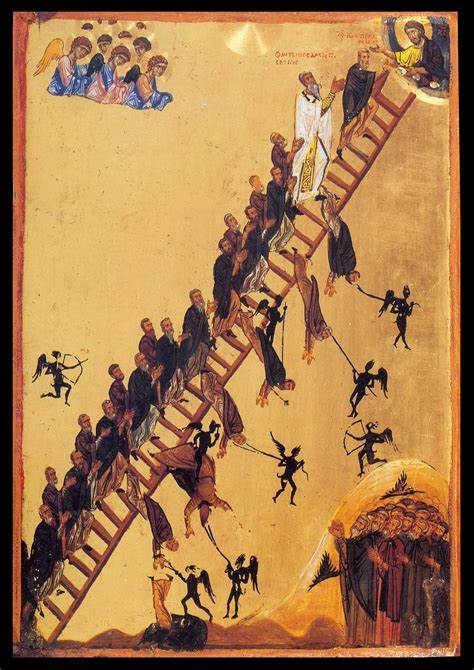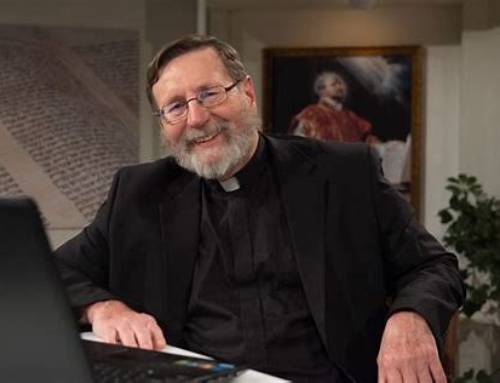Being raised in an Evangelical Protestant world I was taught to reject the belief in purgatory for three reasons. First, it isn’t in the Bible. Second, we are saved by “Faith alone” and purgatory smacks of earning your salvation. Third, we believed in the Calvinist doctrine of eternal security IOW “once saved always saved” and purgatory seemed like “getting a second chance.”
As I moved into Anglicanism and closer to the Catholic faith the Protestant doctrine of “sola Scriptura” – Bible alone–began to disintegrate. It became increasingly clear that people didn’t really believe sola Scriptura. They believed their denomination’s or their personal interpretation of the Bible. This being the case, where was the proper authority for interpreting the Bible? The logical choice was not Pastor Bob at the local Baptist Bible Church or this denomination of that one, but the Church to whom the Epistles of St Paul were written and who eventually determined the canon of the Scriptures in the first place.
There were clearly some practices and beliefs in Christian practice that were not specifically stated or mandated in the Bible. The doctrine of the Holy Trinity was the big one, but it didn’t take much imagination to see that there were all sorts of Christian beliefs and practices in every denomination that developed from traditions and local customs and beliefs. Teetotalism, for example.
Next I had to look at the doctrine of “salvation by faith alone”. In addition to the famous verse in the epistle of James: (faith without works is dead) one had to account for the numerous verses throughout the old and new testaments that spoke of the importance of one’s good works (or lack of) at the judgement. The most famous passage is Matthew 25–the parable of the sheep and goats being judged according to their works of charity. Clearly, while one wasn’t saved by good works one could not ignore the role of works in one’s final judgement.
Finally, was it really true that once a person was “saved” they had their ticket to heaven no questions asked? It seemed not only too good to be true. It seemed to contradict common sense. It made more sense that if a person could engage their free will to accept God’s gift of salvation they might also, at a later date, use that same free will to reject the gift they had accepted. The Catholic Church taught that a person might fall into “mortal sin” and thus turn away from God and turn toward eternal separation from his love.
Purgatory fit into all these cogitations: As I learned more about it I realized that Purgatory wasn’t a “second chance” instead it was a place of purgation–purification and cleansing. Purgatory was a place where we continued, by God’s grace, to work out our salvation with fear and trembling. This gave each soul an enormous measure of dignity. Their choice was honored by God. Their decisions mattered. Their actions mattered, and Purgatory was a way for their actions and decisions to continue to matter. As they climbed the mountain of purgatory their sinful actions were purged, their hearts were purified further as they approached the summit and the realization of their final destiny: eternity in God’s presence.
This belief in Purgatory complemented common sense–realizing that the Catholic faith never contradicts common sense although it often transcends common sense. What do I mean by this? Simply that when I looked at myself and most other people it seemed obvious that we were not such miserable sinners as to burn forever in the lake of fire. Most people, while flawed, mean well and have the desire for all that is beautiful, good and true. On the other hand, most people were also not pure and spotless enough to enter directly into the Lord’s presence.
Purgatory made sense and fit with what was true about salvation: We are saved by grace through faith in Christ’s redeeming work on the cross, his resurrection and ascension into heaven–and not through the good works we have done. However, our choices and actions matter so if we have not “grown up into the full humanity and divinity of Christ” in this life, we continue that work (by God’s grace) in the life to come until at last we are able to see him face to face.







It seems logical to my human mind, that I must 1) be truly sorry for all my sins, venial and mortal, 2) express this verbally in Confession at least once a year and 3) make appropriate reparation for every sin I have committed in my life in order to be in the presence of God for all eternity.
God knows my thinking better than I do and I depend on His Love and Mercy to be stronger than His Justice; I cannot avoid His Justice. Technically, to my human mind, I could be fully ready to be taken into Heaven when I die, but realistically, I must presume I have remaining reparations to be make before I can enter Heaven. Hence Purgatory. How long and how painful is unknown to me. God is Just and Loving, and He shows Mercy when appropriate.
Perhaps Father, you can also write about Indulgences, especially Plenary Indulgences.